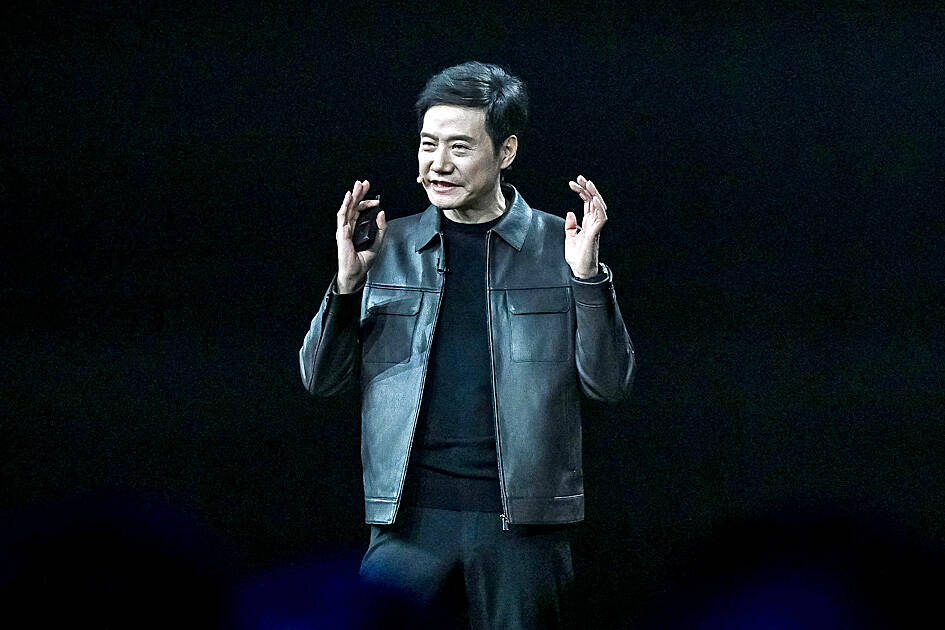Chinese tech giant Xiaomi Corp (小米) is to invest 50 billion yuan (US$6.93 billion) in developing high-end smartphone chips, firm founder Lei Jun (雷軍) said yesterday.
Xiaomi, which sells goods from smartphones to vacuum cleaners and electric vehicles, is one of China’s most prominent consumer electronics firms.
Writing on social media platform WeChat to mark the 15th year since the company’s establishment, Lei said: “Chips are the underlying core track for Xiaomi to break through in cutting-edge technology, so we will definitely make an all-out effort.”

Photo: AFP
In pursuit of Xiaomi’s semiconductor ambitions, the firm has developed an investment plan involving “at least 10 years of investment and at least 50 billion yuan,” Lei added.
Xiaomi took initial steps into semiconductors for smartphones with the launch of the firm’s first in-house chip — the Surge S1 — in 2017. However, the group was forced to halt production of the chip due to technical and financial obstacles, and has since refocused on other components as well as a move into the electric vehicle sector.
“That is not our ‘dark history.’ That is the path we have traveled,” Lei wrote.
Since 2021, Xiaomi’s chip development program has already received 13.5 billion yuan in research-and-development funds for a team of more than 2,500 employees, he said.
The announcement comes in the face of heightened technological tensions between Beijing and Washington, as both nations seek to ensure access to the most advanced components.
A number of Chinese firms are racing to develop their own chips with the aim of freeing themselves from reliance on foreign suppliers in the face of that rivalry.
“Xiaomi has always had a ‘chip dream’,” Lei wrote. “I earnestly request everyone to give us more time and patience to support our continued exploration on this road.”

NEW IDENTITY: Known for its software, India has expanded into hardware, with its semiconductor industry growing from US$38bn in 2023 to US$45bn to US$50bn India on Saturday inaugurated its first semiconductor assembly and test facility, a milestone in the government’s push to reduce dependence on foreign chipmakers and stake a claim in a sector dominated by China. Indian Prime Minister Narendra Modi opened US firm Micron Technology Inc’s semiconductor assembly, test and packaging unit in his home state of Gujarat, hailing the “dawn of a new era” for India’s technology ambitions. “When young Indians look back in the future, they will see this decade as the turning point in our tech future,” Modi told the event, which was broadcast on his YouTube channel. The plant would convert

‘SEISMIC SHIFT’: The researcher forecast there would be about 1.1 billion mobile shipments this year, down from 1.26 billion the prior year and erasing years of gains The global smartphone market is expected to contract 12.9 percent this year due to the unprecedented memorychip shortage, marking “a crisis like no other,” researcher International Data Corp (IDC) said. The new forecast, a dramatic revision down from earlier estimates, gives the latest accounting of the ongoing memory crunch that is affecting every corner of the electronics industry. The demand for advanced memory to power artificial intelligence (AI) tasks has drained global supply until well into next year and jeopardizes the business model of many smartphone makers. IDC forecast about 1.1 billion mobile shipments this year, down from 1.26 billion the prior

People stand in a Pokemon store in Tokyo on Thursday. One of the world highest-grossing franchises is celebrated its 30th anniversary yesterday.

Zimbabwe’s ban on raw lithium exports is forcing Chinese miners to rethink their strategy, speeding up plans to process the metal locally instead of shipping it to China’s vast rechargeable battery industry. The country is Africa’s largest lithium producer and has one of the world’s largest reserves, according to the US Geological Survey (USGS). Zimbabwe already banned the export of lithium ore in 2022 and last year announced it would halt exports of lithium concentrates from January next year. However, on Wednesday it imposed the ban with immediate effect, leaving unclear what the lithium mining sector would do in the